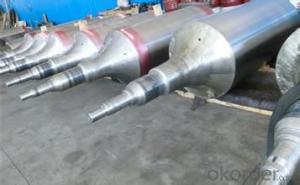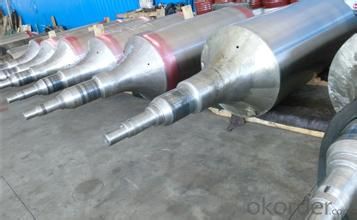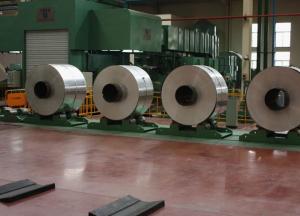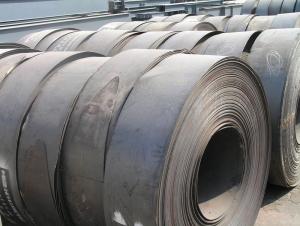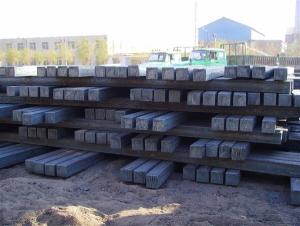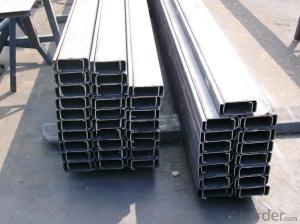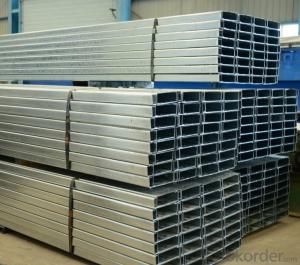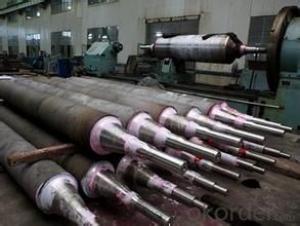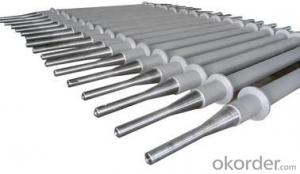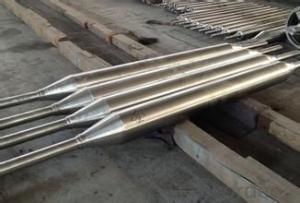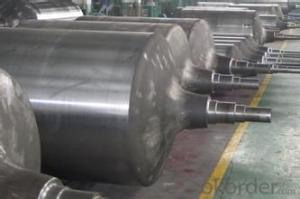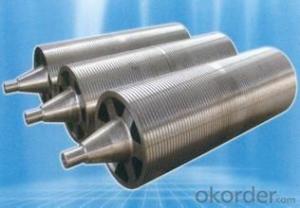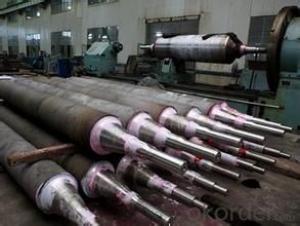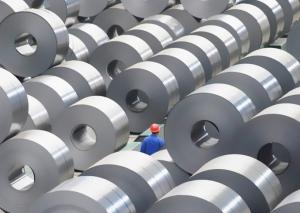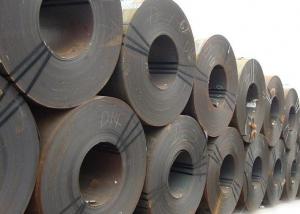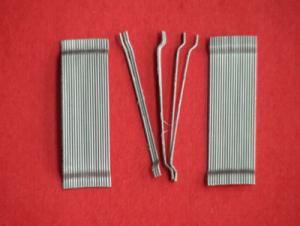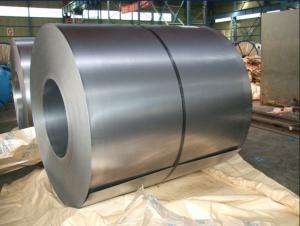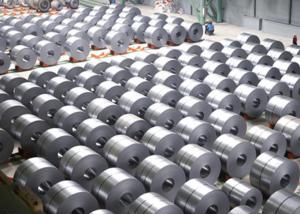Centrifugal Casting Heat Resistant Furnace Roll 2015
- Loading Port:
- Tianjin
- Payment Terms:
- TT OR LC
- Min Order Qty:
- 1000 PCS
- Supply Capability:
- 10000 PCS/month
OKorder Service Pledge
OKorder Financial Service
You Might Also Like
Quick Details
| Condition: | New | Type: | Other | Usage: | Heat Treatment Furnace |
| Place of Origin: | Brand Name: | Model Number: | Furnace roller | ||
| Application: | Heat treatment furnace |
Packaging & Delivery
| Packaging Detail: | plywood composited with steel box, seaworthy package |
| Delivery Detail: | 2-4month |
Specifications
furnace roller:
1. made of centrifugall casting and sand casting
2.high temperature resistant
Product Description
Furnace rollers used in CAL, CGL and heat treatment industry etc.
Scope: high temperature or low temperature's furnace roller inside of furnace
1: O.D.: such as: 685mm ,800 mm ,900 mm, 1000mm,1100mm ,1200mm,1300mm, 1350mm, 1400mm,1500mm,1600mm,etc
2: Material: stainless steel of SUS304, HK40,KHR12C, KHR11C etc,
3: Centrifugal casting of body, sand casting of cone, outsourced shaft or casting.
4: With wear-resistant coating or corrosion resistant coating sprayed in the surface
5: Inspection:
a: Chemical composition test by spectrometer during smelting;
b: Inside surface boring or not as per requirements;
c PT test;
Packaging & Shipping
Plywood composite with steel box ,seaworthy package
- Q: How is steel used in the manufacturing of appliances?
- Steel is commonly used in the manufacturing of appliances due to its strength and durability. It is used to construct the outer casings and frames of appliances, providing structural support and protection. Additionally, steel is used for internal components such as heating elements, coils, and grills, where its heat resistance and conductivity are beneficial. Overall, steel plays a crucial role in ensuring the longevity and performance of appliances.
- Q: What are the different methods of testing the quality of steel products?
- There are several methods used to test the quality of steel products. These include destructive testing methods such as tension tests, impact tests, and hardness tests, which involve subjecting the steel to controlled forces and measuring its response. Non-destructive testing methods like ultrasonic testing, magnetic particle testing, and radiographic testing are also commonly used to detect any flaws or defects in the steel without causing damage. Additionally, chemical analysis and visual inspection are employed to assess the composition and surface quality of the steel products.
- Q: How are steel profiles used in the fabrication of storage racks?
- Steel profiles are used in the fabrication of storage racks to provide strength, stability, and durability to the structure. These profiles serve as the main framework of the racks, supporting the weight of the items being stored and ensuring the overall stability of the system. Additionally, steel profiles can be customized to meet specific storage requirements, allowing for adjustable shelving heights and configurations. Overall, steel profiles play a crucial role in enhancing the functionality and longevity of storage racks.
- Q: What are the common types of steel products used in the hospitality industry?
- The common types of steel products used in the hospitality industry include stainless steel kitchen equipment such as sinks, countertops, and shelves, as well as stainless steel cutlery, drinkware, and serving trays. Steel furniture like chairs, tables, and bar stools are also commonly found in hotels and restaurants. Additionally, steel door frames, security grills, and safety rails are used for security purposes in the hospitality industry.
- Q: What are the common uses of steel in the telecommunications industry?
- Steel is commonly used in the telecommunications industry for various purposes such as supporting structures for cell towers, transmission line towers, and antenna mounts. It provides the necessary strength, durability, and stability required for the infrastructure of telecommunication networks.
- Q: How do steel products withstand extreme temperatures and weather conditions?
- Steel products are able to withstand extreme temperatures and weather conditions due to their strong and durable nature. The composition of steel, which includes iron and carbon, provides it with high tensile strength and resistance against deformation. Additionally, steel can be further enhanced through processes like galvanization or coating, which provide a protective layer against corrosion. This combination of strength and protective measures allows steel products to endure extreme temperatures, such as high heat or freezing cold, as well as harsh weather conditions like heavy rain, wind, or snow.
- Q: How is steel used in the manufacturing of storage tanks?
- Steel is commonly used in the manufacturing of storage tanks due to its durability, strength, and resistance to corrosion. It provides a sturdy structure that can withstand high pressures and extreme weather conditions. Steel tanks can be fabricated in various sizes and shapes to accommodate different storage needs, making them versatile for storing various substances such as water, oil, chemicals, and gases.
- Q: What are the different types of steel forgings and their applications in the defense industry?
- There are various types of steel forgings used in the defense industry, including carbon steel forgings, alloy steel forgings, and stainless steel forgings. Carbon steel forgings offer excellent strength, toughness, and wear resistance, making them suitable for applications such as weapon components, tanks, and armored vehicles. Alloy steel forgings provide enhanced strength, durability, and corrosion resistance, making them ideal for applications like aircraft landing gear, missile components, and submarine parts. Stainless steel forgings are known for their excellent corrosion resistance and high strength, making them suitable for applications such as naval vessels, submarines, and aircraft components exposed to harsh environments. Overall, steel forgings play a critical role in the defense industry by providing essential components that ensure the reliability and performance of various defense systems and equipment.
- Q: What are the common types of steel products used in the automotive aftermarket industry?
- The common types of steel products used in the automotive aftermarket industry include sheet metal, structural steel, tubes and pipes, bars and rods, and various specialized steel components for engines, suspensions, and body parts.
- Q: What are the different grades of steel and their applications?
- There are several different grades of steel, each with its own unique properties and applications. Some common grades include carbon steel, stainless steel, and alloy steel. Carbon steel is the most commonly used grade and is suitable for a wide range of applications, including construction, automotive manufacturing, and general engineering. Stainless steel is known for its corrosion resistance and is often used in the production of kitchen utensils, medical equipment, and architectural structures. Alloy steel, on the other hand, is a combination of different elements to enhance its strength, hardness, and durability, making it ideal for applications such as aerospace, oil and gas, and automotive components.
Send your message to us
Centrifugal Casting Heat Resistant Furnace Roll 2015
- Loading Port:
- Tianjin
- Payment Terms:
- TT OR LC
- Min Order Qty:
- 1000 PCS
- Supply Capability:
- 10000 PCS/month
OKorder Service Pledge
OKorder Financial Service
Similar products
Hot products
Hot Searches
Related keywords
